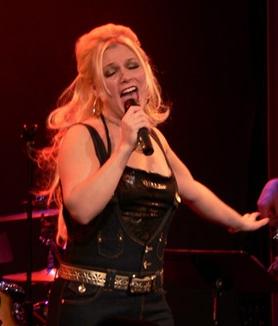|
 J:
What are your best and worst performing experiences? Particularly, with
this character, did you ever have a bad experience because of a bad
reaction to the vulgarity, or it coming across as harsh? J:
What are your best and worst performing experiences? Particularly, with
this character, did you ever have a bad experience because of a bad
reaction to the vulgarity, or it coming across as harsh?
WS: I don’t know that I’ve ever had people boo or tell me to shut up. I
had one audience -- I had a manager at the time who had me booked on a
gay pride show that was in Allentown, Pa. We walked into a restaurant
called the Moosehead Bar & Grill, and [in character]: ‘Moosehead? I’m
Wendy Ho and I’m gonna go play the Moosehead? OK, let’s do this.’ We
walked in and there was a huge drag queen, and I was trying to get these
people’s attention. The way the room was configured -- there was a bar
that wrapped around and they were still playing music while I was trying
to sing. That was probably one of the worst.
I also played a show in Salt Lake City. It’s very conservative there,
but it was for a gay crowd. I remember after the show someone coming up
to me and talking to me and I talked to them normally, ‘How are you
doing? Thank you so much,’ and they reacted ‘What? What are you doing? I
don’t understand?’ They got angry with me for not being the character
when I got offstage. That’s not particularly bad, but it was just funny
to me. I had a few -- the Moosehead sticks in my memory.
Then I played a show here at what used to be the Improv, which I think
is now the Broadway Comedy Club. I only played there once on an
‘Industry Night,’ which was total bullshit -- there was no industry
there. This was very early days. They stuck us in a corner where they
were frying chicken basically. I just walked out immediately and used it
in the character -- ‘They’re trying to make us come up in here with all
the fried chicken?!?! My wig smells.’ I never had people booing for me
to get off the stage. I just had bad situations to perform in, where
people were distracted by music, and weren’t going to listen or they
weren’t there for that.
J: What were some of the best performances?
WS: Definitely one of the best performances I ever had was at this big
birthday party they had at the Roxy. It was roller skating night, so I
got to sing my songs as people were roller skating, and people
congregated. I remember seeing a group of people skating by when I was
singing my last song, ‘Fuck Me.’ This one girl had heard one word and
wiped out laughing so hard. It was one of the best reactions I’ve ever
seen. And then just being in the Roxy. To me that’s a piece of gay icon
history to play a place like that. Definitely my performance -- I
usually play with tracks and for that one I had a live band. That was
amazing, an amazing experience all the way around.
I’ve done a couple Wendy Ho shows at Caroline’s and those are always
amazing too -- just great getting to work with Susie Essman, Judy Gold …
J: You’re perfect to warm up for Susie Essman.
WS: I love her. She said, ‘I am mild compared to her!’
J: How many of your bookings are exclusively gay audiences and how many
are not? How do they compare? How are they different?
WS: The thing is, I’ve heard a lot of comedians say gay audiences are
the hardest audiences to perform for. I would agree with that, however,
in my case, we’re dealing with a character that is like a female drag
queen, and they go crazy for it. They just are the best audience. Once
you do have a gay audience, you have them forever -- till the end of
days. They’re just wonderful.
I haven’t really played a whole lot of straight audiences. The ones I
have played, I’ve had just as good of a time. But the reaction from them
is usually a little more polite, not as crazy, not as rambunctious. The
reason why I relate to gay men and women so much is ‘Ho’ to me was
something I was in the closet with. There’s this aspect of myself I
wanted to let out and for people to see it. When you have something that
outrageous inside yourself, those are people who are going to relate to
it.
I’m not opposed to playing for straight audiences. I’ll play wherever
they will let me in and give me a little bit of cash. It just seems to
be reaction and attention I guess.
The other difference is that playing in gay clubs and for gay men, you
have never have been treated better. They’re just nice for the most
part. The clubs are just nicer. When I played that Improv show where I
was treated like ‘welcome into the asshole entrance to the entertainment
world.’ -- seedy little dark clubs -- gay clubs can be seedy too but at
least there’s a backstage green room (laughs).
J: What are your influences for the ‘Wendy Ho’ character and in
performing in general?
WS: Musically, definitely Erykah Badu -- I don’t think I sound like her,
but attitude-wise; Mary J. Blige; Missy Elliott; comedy wise, definitely
Margaret Cho, Susie Essman, and as far as always looking up to Bette
Midler -- people have called me a ‘twenty-first century Bathhouse
Betty.’ I love that. It’s a very high complement. I just love soul music
and hip hop -- Jill Scott, Angie Stone -- a lot of neo-soul too, I like.
J: Even Kenny Rogers [Wendy parodies ‘The Gambler’ in her song ‘The AIDS
Gamble’].
WS: I don’t know if he’d be an influence but I guess so … I remember
sitting around with my girlfriend and we were listening to him one day
and she said to me, ‘You know girl, you shouldn’t floss your teeth.’ I
said, ‘What are you talking about? What’s this flossing your teeth thing
about?’ She said, ‘AIDS can get transferred from flossing your teeth,
and if you suck someone’s dick who’s got AIDS, then …’ I remember
laughing so hard and we were listening to Kenny Rogers and just started
‘Never floss …’ [to tune of ‘never count your money…’]
I come up with the songs a variety of ways. Sometimes I'll have a
subject I want to work out, and I'll take a verse or a chorus into the
studio and write with my writing partner, Craig Levy. But, most of the
time, inspiration will strike when I'm amongst my friends. I've noticed
as of late, that pretty much everyone I hang out with is hilarious. Its
kind of a pre-requisite to be my friend!
J: Do you ever have problems with being white and doing a black
character?
WS: I was really scared when I first started doing it, thinking that I
would. Sometimes I’ll get a look, but again it goes back to the joke
being on me and on this character. She’s being so blatant; it has
nothing to do with these being ‘black issues.’ I have yet to see an
African-American audience member [react badly] … at first they might
give me a look when I say the line, ‘surprise, I’m black!’ They’ll look
at me like, ‘O.K., girl’ [skeptical]. But then I sing ‘Fuck Me’ and they
lose it, so it’s redeemed. I remember I did a show at Caroline’s and
Miss Jo of Hot 97 was in the audience and invited me on her show. I
never expected that. I never thought any black woman would ask me to be
on her radio show, and she loved me and brought me on and was so nice to
me, and played part of ‘Bitch I Stole Your Purse’ on the air. She was
great.
She asked me that question too. I haven’t met anyone who said I should
not be doing that; that’s not funny. At the end of the day, it’s funny.
If people … deep offense is built into the ship of comedy. If people are
going out to a comedy show looking to be offended, they will find
offense in it because that’s the way it’s built. But a good comic always
knows how to build offense into a joke and also give the audience the
release they need and the laughter. There’s definitely offense in what I
do but I feel there’s always a release opportunity for everybody. …
It’s always so funny when I do interviews, people ask me where I’m from,
and after I perform too. Does that tell you anything? I know people are
just curious but does that explain anything about the character?
J: People wonder what deep-seated childhood trauma informs their comedy,
or think they’re sad people or…
WS: Well, in my show I definitely can go on about that -- I was born
into a family that lived in a trailer park for 10 years and I always
joke around about praying for a person of color to come down and rescue
me from the heaps of white trash I was surrounded by. A big influence in
this act too is my best friend who I grew up with until I was 10, Tamika
Cook, a black girl, and the way she talked with me and her mom, I just
died, it was so funny. It was the first time there was ever ‘Hello? I
don’t understand what you’re saying.’ She invited me to go to this
party, saying, ‘My mom is having a ‘Jeri’ party and wants you to come.’
I thought, ‘I don’t know who Jerry is?’ She said, ‘no -- jewelry --
necklaces, earrings …’ We would laugh about that kind of stuff. She was
definitely a big influence on me. That would tell you my need to express
myself or my attraction to the African-American community I guess
because there was none to speak of when I was growing up. My mom and dad
would listen to a lot of old soul music and I always loved singing [to
it]. |

